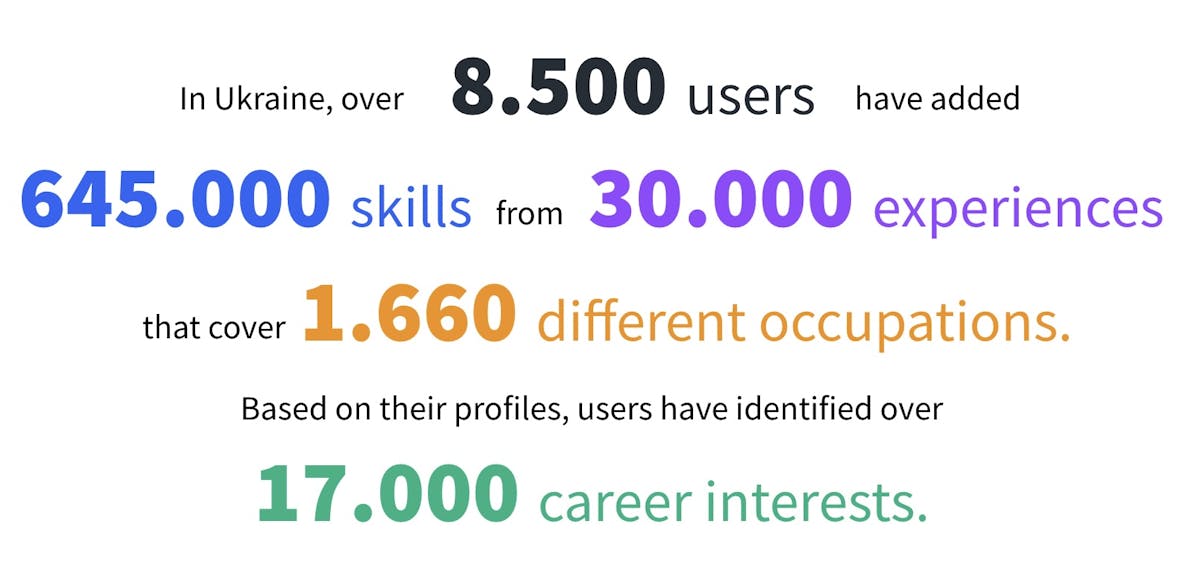Unlocking the Potential of Ukraine's Veterans
SkillLab’s recent white paper, “Unlocking Veteran Potential: The Power of User-Validated Skill Data in Ukraine,” offer valuable insights into addressing Ukraine’s labor market challenges amid ongoing conflict, with a particular focus on integrating veterans into the civilian workforce.
We recently published a series of white papers, including “Unlocking Veteran Potential: The Power of User-Validated Skill Data in Ukraine”. This paper, which is the second of a series of three offers valuable insights into addressing Ukraine’s labor market challenges amid ongoing conflict. Based on work with the State Employment Service of Ukraine, supported by the Norwegian Refugee Council, the World Bank, and key Ukrainian government ministries, the study analyzes data from 8,500 user profiles (including veterans), encompassing 645,000 skills and 30,000 experiences. This user-validated skill data is crucial for creating pathways to employment, especially for veterans transitioning to civilian roles

In the first 9 months, users have added over 645.000 skills to their profiles
Key Findings
Skills Portfolio of Veterans
Veterans possess a substantial and diverse skills portfolio acquired through military service, including both military-specific competencies and many abilities transferable to civilian employment.
Transferability to Civilian Roles
A significant majority (74%) of analyzed veteran profiles showed skills matching potential occupations outside the traditional military sphere. Strong matches were found in fields like "Manufacturing & Machine Operations," "Driving & Transportation," and non-military roles within "Security, Police & Armed Forces".
Meeting Labor Market Needs
Crucially, 63% of veteran profiles matched with at least one non-military career classified as "in-demand," highlighting their potential to fill critical workforce gaps.
Diverse Career Interests
Veterans express interest in a wide array of civilian occupations beyond common assumptions, spanning fields like driving, logistics, security, human resources, healthcare, and emergency services. This underscores the need for broad career guidance.
Value of All Experiences
For the broader group studied (including non-veterans), many essential skills in areas like communication, collaboration, and caring were acquired through life experiences, not just formal employment or education. This highlights the importance of recognizing informal learning.

I'm happy with the platform's recommendations because I'm now doing something I enjoy. I can share my experience with young people, prepare them for different situations, and be useful in this difficult time.
Implications for Veteran Integration in Workforce Development
- Recognizing Military-Acquired Skills: The study emphasizes the high degree of skill transferability from military service to civilian sectors. Recognizing these skills is fundamental.
- Bridging to Civilian Careers: Workforce initiatives should focus on leveraging veterans' transferable skills and addressing the diversity of their career interests, looking beyond traditional transition pathways.
- Targeted Support & Training: While many skills translate, targeted training might be needed to bridge specific gaps for certain civilian roles.
- Employer Education: Educating civilian employers on the value and applicability of military-acquired skills is essential for successful integration.
- Inclusive Strategies: By using a skills-first approach that recognizes diverse skill sources (including military experience), more people, including veterans, can be brought into the labor force, addressing labor shortages and promoting economic resilience
The findings highlight the potential of user-validated skill data in creating more inclusive and effective workforce strategies, particularly for veteran reintegration. By embracing a skills-based approach, Ukraine can foster a more adaptable workforce ready to meet the challenges of national reconstruction and drive economic recovery.
Read the full white paper in English and in Ukrainian.